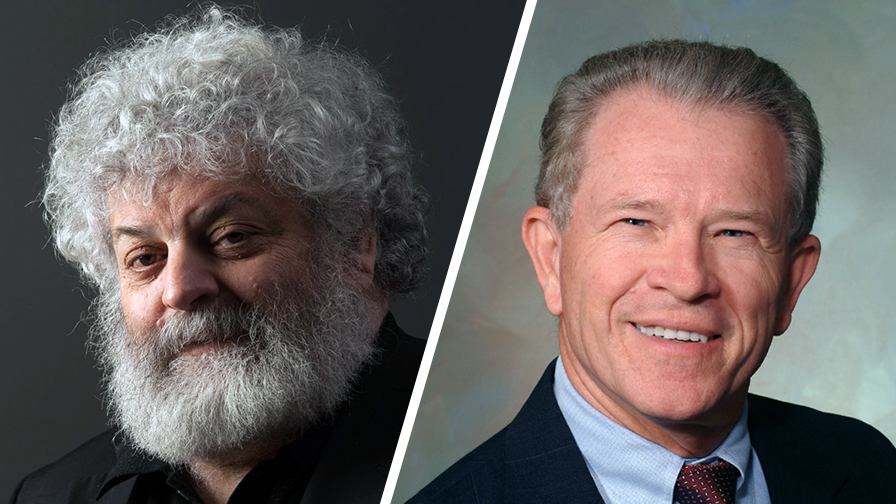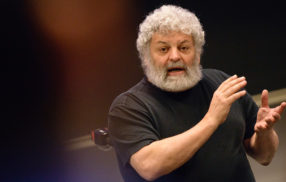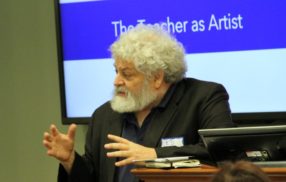
UVA Darden Professors Win Aspen Institute Award for Innovative Course on Economic Inequality
By Laura Hennessey Martens
What is the meaning of economic inequality and social mobility, how are they measured, and how have they changed over time in the United States and the rest of the world
What are the causes and effects of rising inequality, and what may the future look like if this trend continues?
Finally, what does this all mean for business leaders — and what might they do about it?
These are the thorny dialogues University of Virginia Darden School of Business MBA students delve into throughout the intensive eight-week “Economic Inequality and Social Mobility” seminar co-taught by Professors Jim Freeland and Ed Freeman. The innovative course was named today as a winner of the 2017 Ideas Worth Teaching Award by the Aspen Institute Business & Society Program, which highlights 20 exceptional courses that “inspire and equip future business leaders to tackle the issues of our time.”
In a news release issued this morning, the Aspen Institute said this year’s winning courses focused on “critical social issues ripped from the headlines — populism, water scarcity and artificial intelligence among them — and illuminate how and why these issues are business issues.”
As Freeland and Freeman’s students learn in the course, economic inequality and social mobility are challenging problems to dissect. The concepts are multilayered, not only because of the inherent complexities of economic systems such as capitalism, but also because they expose an underbelly of intersectionality-related issues connected to wealth and privilege, social status, inherent biases, and the very definitions of fairness and equity in a capitalist system.
According to Freeland, who first created and taught the course with Professor Ed Hess as a special elective in 2014, “We felt the challenges associated with economic inequality and social mobility were among the most important issues facing society. Business leaders must not only understand these issues, but they must lead efforts to address them. To our knowledge, no business school had courses focused on these topics.”
In recent years, the topics of economic inequality and social mobility have served as frequent fodder for debate on news and talk shows, featuring pundits from all sides of the political and economic spectrum. Freeland and Freeman guide the students to explore these issues from a wide range of perspectives, using a variety of teaching materials and sources, including books, articles, podcasts, videos and TEDx talks as generators for robust discussions.
“Growing up in the Bronx, I knew from a young age that economic inequality existed,” said Darden student Terence McElroy (Class of 2018). “Yet I never sought to understand why economic inequality existed and how I could make a difference until taking Professor Freeman’s and Professor Freeland’s ‘Economic Inequality and Social Mobility’ course. The course opened my eyes to the causes of economic inequality and the ways I can make a difference.”
In the United States, where the top 10 percent now average more than nine times as much income as the lower 90 percent — and the top 0.1 percent make over 198 times those at the bottom — attaining the “American Dream” of economic prosperity seems farther and farther out of reach for many. According to Inequality.org, since 1979, the before-tax incomes of the top one percent of America’s households have increased more than four times faster than those in the bottom 20 percent.
“Our course highlights a trio of inequalities the U.S. and many other countries face: income, wealth and opportunity,” said Freeman. “Businesses have the potential to be a major force in reversing the trend of rising inequality, but only if they value people as well as profits — only if business leaders understand these issues and learn how to make business a part of the solution.”
“At a time when business leaders face intense scrutiny about their role in social issues, these award-winning faculty are bravely challenging the ‘norms’ of what is taught in business school — and creating leaders who can navigate a highly uncertain environment,” said Claire Preisser, associate director of the Aspen Institute Business & Society Program.
Syllabi for this year’s award-winning courses, full biographies of the winners and additional details are available online at www.ideasworthteachingawards.com.
The University of Virginia Darden School of Business prepares responsible global leaders through unparalleled transformational learning experiences. Darden’s graduate degree programs (MBA, MSBA and Ph.D.) and Executive Education & Lifelong Learning programs offered by the Darden School Foundation set the stage for a lifetime of career advancement and impact. Darden’s top-ranked faculty, renowned for teaching excellence, inspires and shapes modern business leadership worldwide through research, thought leadership and business publishing. Darden has Grounds in Charlottesville, Virginia, and the Washington, D.C., area and a global community that includes 18,000 alumni in 90 countries. Darden was established in 1955 at the University of Virginia, a top public university founded by Thomas Jefferson in 1819 in Charlottesville, Virginia.
Press Contact
Molly Mitchell
Senior Associate Director, Editorial and Media Relations
Darden School of Business
University of Virginia
MitchellM@darden.virginia.edu







